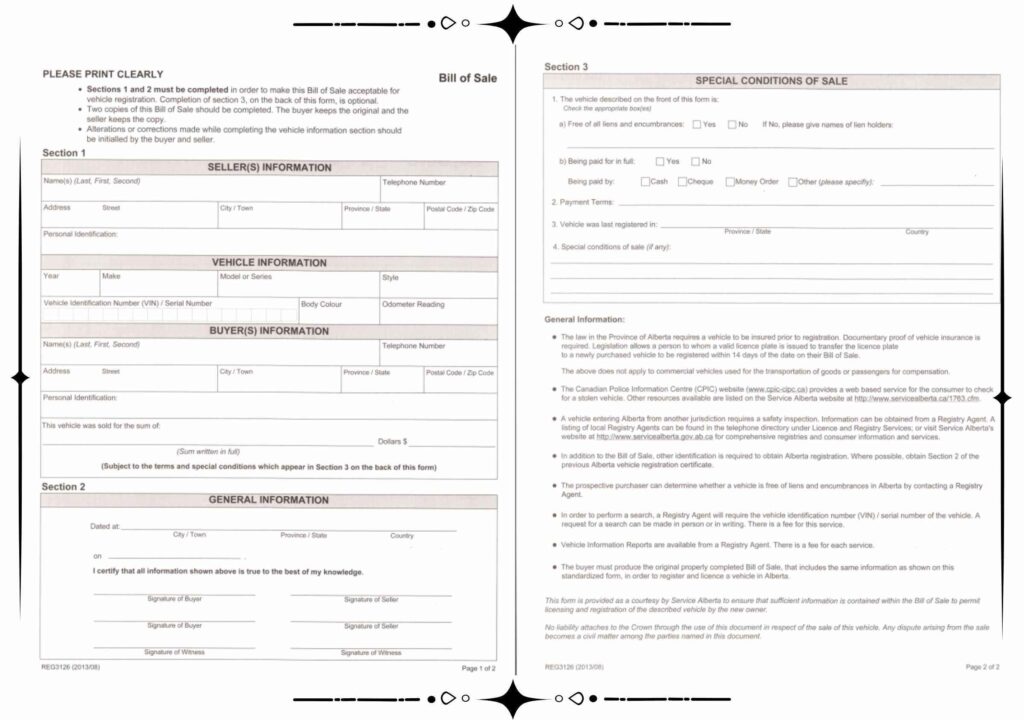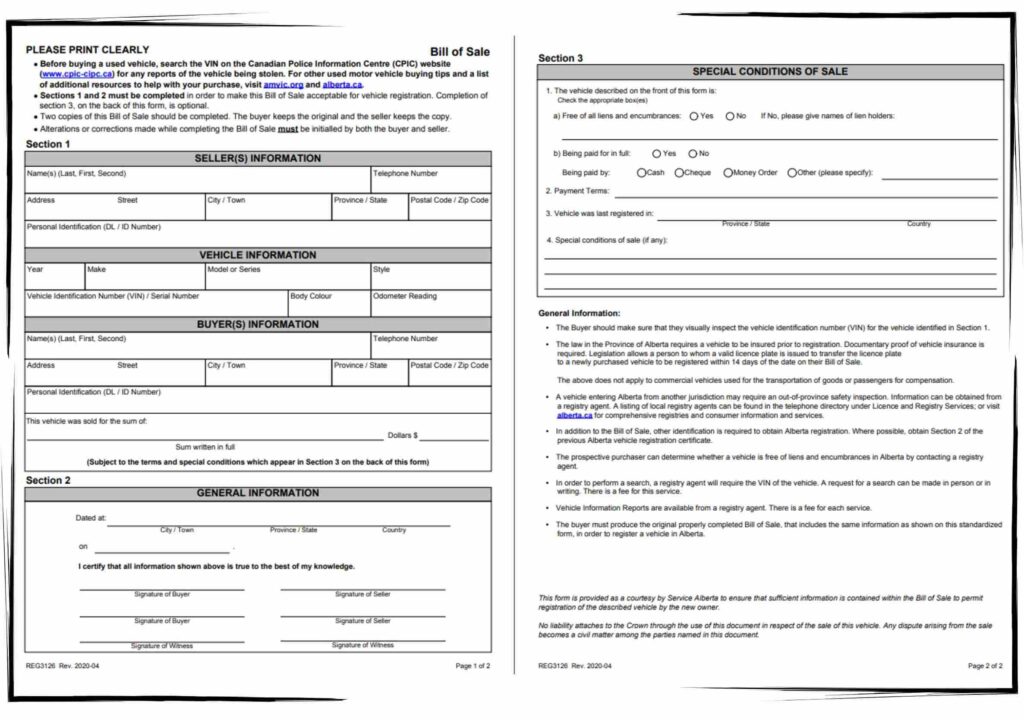“How long is a Bill of Sale valid in Alberta?” Understanding the validity period of a Bill of Sale is crucial for both buyers and sellers. A Bill of Sale is a legal document that records the transfer of ownership of goods, assets, or property from one party to another. It outlines the details of the transaction, including the sale price, description of the item(s) sold, the names and signatures of the buyer and seller, and the date of the sale. In Alberta, a Bill of Sale is an essential document used in various transactions, such as vehicle sales, property transfers, and other exchanges of goods or services.
The validity period refers to the duration during which the Bill of Sale remains legally binding and enforceable. It is essential to know the validity period to ensure that the transaction remains valid and legally recognized by authorities and third parties. Failure to understand the validity period can lead to legal complications or disputes in the future. Therefore, knowing the duration of validity ensures compliance with legal requirements and provides clarity and certainty regarding the ownership transfer.
Table of Contents
ToggleHow Long Is a Bill of Sale Valid In Alberta?
A Standard Bill of Sale in Alberta does not come with an expiration date and remains valid indefinitely.
Here’s why the absence of an expiry date isn’t a concern:
- Proof of Ownership Transfer: The bill of sale acts as a legal document confirming the transfer of ownership from the seller to the buyer on a specific date. This confirmation remains legally binding regardless of the passage of time.
- Registration Purposes: The primary purpose of the bill of sale is to facilitate the registration of the vehicle under the new owner’s name at the Alberta Motor Vehicle Registry (AMVR). As long as the details in the bill of sale accurately reflect the sale transaction, it can be used for registration, regardless of how much time has elapsed since the sale.
However, it’s essential to keep in mind that although the bill of sale itself doesn’t expire, certain factors can affect the vehicle registration process:
- Vehicle Registration Renewal: Vehicle registrations in Alberta require periodic renewal. While the bill of sale establishes initial ownership, maintaining an up-to-date vehicle registration is a separate requirement.
- Change in Vehicle Ownership: If the vehicle undergoes subsequent sales after the initial private transaction, a new Standard Bill of Sale will be necessary for the subsequent transfer of ownership.
In summary:
- The Standard Bill of Sale serves as a permanent record of the ownership transfer at a specific moment in time.
- It retains its validity for vehicle registration purposes, even after a considerable period post-sale, as long as the information remains accurate.
Here’s an additional tip:
- It’s advisable to retain a copy of the Standard Bill of Sale for your records, even if the vehicle is sold again in the future. This can be beneficial for demonstrating ownership history and resolving any potential disputes.
Alberta Bill of Sale Free Template
Alberta Bill of Sale Free Template
Alberta Bill of Sale PDF
Types of Transactions and Their Validity Periods
The validity of documents in transactions can differ based on factors like the transaction type, jurisdiction, and specific purpose of the document. Here’s an overview of various transaction types and their associated documents:
Vehicle Sales:
- Document: Standard Bill of Sale (applies universally)
- Validity Period: Indefinite. It acts as a permanent record of ownership transfer, usable for vehicle registration over time if information remains accurate.
- Additional Notes: While the bill itself doesn’t expire, vehicle registration requires periodic renewal; a new bill is needed upon resale.
Property Sales:
- Document: Deed of Sale (varies by jurisdiction)
- Validity Period: Indefinite. Similar to a Standard Bill of Sale, it’s a permanent record for real estate ownership transfer.
- Additional Notes: Although the deed doesn’t expire, obligations like property taxes must be met by the new owner.
Other Goods and Services:
- Document: Varies (e.g., Bill of Sale, Warranty documents, Service contracts, Receipts)
- Validity Period: Highly variable:
- Warranties: Usually specified, ranging from months to years.
- Service Contracts: Defined term or ongoing until canceled.
- Receipts: Kept for tax or return purposes, usually for a few years.
- Important Note: These are general guidelines; laws may differ. Consult legal or government sources for precise validity periods in your area.
Renewal or Extension Options
Renewing or extending a Standard Bill of Sale is not a concept that applies. Here’s why:
- Permanent Record: The Standard Bill of Sale acts as a permanent legal record of ownership transfer at a specific moment. It doesn’t have an expiry date associated with it.
- Vehicle Registration: The purpose of the Standard Bill of Sale is primarily for registering a vehicle under a new owner’s name. Once this registration is complete, there’s no need to renew the bill of sale itself.
However, there are related considerations to keep in mind:
- Vehicle Registration Renewal: Vehicle registration typically requires periodic renewal in most jurisdictions, including Alberta (usually annually or every few years). This process is separate from the Standard Bill of Sale.
- Change of Ownership: If a vehicle is sold again after the initial private sale, a new Standard Bill of Sale will be necessary to document the transfer of ownership to the subsequent buyer.
Regarding legal considerations and record-keeping:
- Importance of Keeping the Bill of Sale: Although it doesn’t need renewal, both the buyer and seller should retain a copy of the Standard Bill of Sale for their records. This is beneficial for proving ownership history, resolving potential disputes, and meeting insurance requirements.
- General Record Keeping Recommendations: While there are no specific legal mandates dictating how long to keep a Standard Bill of Sale, it’s generally recommended to retain it for several years, especially if there’s a possibility of selling the vehicle again in the future.
In conclusion:
A Standard Bill of Sale is a permanent record and doesn’t require renewal or extension. However, factors like vehicle registration and record-keeping practices are separate considerations. For the most accurate information on regulations and best practices, consulting with your local motor vehicle department or a legal professional is advisable.
Importance of Keeping Records
Maintaining thorough records is paramount for various reasons, particularly in transactions like vehicle sales, which are documented by a Standard Bill of Sale in Alberta. Here’s a breakdown of crucial aspects:
Documentation Practices:
- Maintaining Copies: Both the buyer and seller should retain a copy of the Standard Bill of Sale. This ensures that each party possesses a documented record of all transaction particulars.
- Clarity and Accuracy: The bill of sale must be clear, concise, and encompass all essential information, including:
- Buyer and seller particulars
- Vehicle description, including VIN
- Sale specifics (date, purchase price)
- Any additional agreed-upon terms
- Organization: Utilizing a downloadable Standard Bill of Sale template from the Alberta government website ensures the creation of a well-structured and easily comprehensible document.
Legal Protection and Risk Mitigation:
- Proof of Ownership: The Standard Bill of Sale serves as a legal instrument validating the transfer of vehicle ownership from the seller to the buyer. This holds significance in various scenarios:
- Vehicle Registration: It’s mandatory for registering the vehicle under the new owner’s name.
- Future Disputes: In case of disagreements regarding the sale, such as vehicle condition or payment issues, the bill of sale acts as documented evidence of the agreed-upon terms.
- Risk Mitigation: Proper record-keeping aids in mitigating potential risks for both parties:
- Buyer Protection: It provides documented proof of ownership and purchase details, beneficial for insurance purposes or addressing potential vehicle issues post-sale.
- Seller Protection: It creates a record of the sale, including crucial details like date, price, and buyer information, which can be pivotal in refuting fraudulent claims or handling future inquiries.
In essence, maintaining transparent and accurate records through a well-documented Standard Bill of Sale offers significant benefits to both parties involved in a vehicle sale by:
- Facilitating a smooth transaction: Ensures a comprehensive understanding of sale specifics and helps prevent registration delays.
- Providing legal protection: Acts as tangible evidence in potential disputes down the line.
- Minimizing risks: Reduces the likelihood of complications for both the buyer and seller.
Additional Tips:
- Store your copy of the Standard Bill of Sale securely alongside other relevant vehicle documents.
- Consider creating digital copies as an extra backup measure.
FAQ
What is a Bill of Sale?
A Bill of Sale is a legal document that transfers ownership of goods from one person (seller) to another (buyer). It serves multiple purposes and acts as a crucial record of the transaction. Here’s an overview of its key functions:
- Proof of Ownership Transfer:
- It establishes that the seller has legally transferred ownership of the items to the buyer.
- Sales Agreement:
- It documents essential details such as the items sold, sale price, and date of the transaction.
- Registration Facilitation:
- For certain items like vehicles or boats, a Bill of Sale may be necessary to register them under the new owner’s name.
Bills of Sale are commonly used for various types of sales, including vehicles (cars, motorcycles, boats), furniture, livestock, business assets, and more. While not mandatory for all transactions, they are highly recommended for significant private sales. They offer several benefits for both parties involved:
- Clear Record of Agreement: Provides a documented record of the sale terms and conditions, reducing the risk of misunderstandings or disputes.
- Protection of Interests: Safeguards the interests of both the buyer and seller by outlining the rights and responsibilities of each party.
Some additional points to keep in mind about Bills of Sale:
- The specific requirements for a Bill of Sale can vary based on the jurisdiction (state, province, country) where the sale takes place.
- Official templates may be available on government websites, or individuals can create their own document, ensuring it includes all necessary information.
- In certain situations, a Bill of Sale might require witnessing or notarization to be considered valid under the law. It’s essential to understand and comply with any such legal requirements.
Is There a Specific Validity Period for a Bill of Sale in Alberta?
No, there isn’t a specified validity period for a Bill of Sale in Alberta, particularly for standard bills of sale used in private vehicle sales. Here’s why:
- Permanent Record: The Bill of Sale (known as a Standard Bill of Sale in Alberta) acts as a permanent legal record of the ownership transfer at a specific point in time. It affirms that the seller transferred ownership to the buyer on a specific date, and this record remains valid indefinitely.
- Registration Usage: The primary purpose of the Bill of Sale is for registering the vehicle under the new owner’s name at the Alberta Motor Vehicle Registry (AMVR). As long as the information on the Bill of Sale accurately reflects the sale, it can be utilized for registration, even if a substantial time has elapsed since the sale.
However, it’s crucial to note a few distinctions:
- Vehicle Registration Renewal: Although the Bill of Sale doesn’t expire, vehicle registrations in Alberta mandate periodic renewal, usually annually or every few years. This renewal process is separate from the Standard Bill of Sale.
- Change of Ownership: If the vehicle undergoes subsequent private sales after the initial one, a new Standard Bill of Sale becomes necessary to document the transfer of ownership to the subsequent buyer.
In summary:
The Standard Bill of Sale acts as a permanent record, not requiring renewal or extension. It establishes a historical record of ownership transfer and remains valid for vehicle registration purposes, even over extended periods, provided the information remains accurate.
Do I Need to Renew My Bill of Sale for Vehicle Registration?
No, there’s no need to renew your Bill of Sale (also known as a Standard Bill of Sale in Alberta) for vehicle registration in the province. Here’s why:
- Permanent Record: The Standard Bill of Sale acts as a permanent legal record, confirming that ownership of the vehicle was transferred from the seller to you on a specific date. This record doesn’t have an expiration date.
- Registration Usage: Initially, the Standard Bill of Sale is used to register the vehicle under your name at the Alberta Motor Vehicle Registry (AMVR). As long as the details on the bill of sale are accurate, it remains valid for registration, even if a considerable time has passed since the sale.
However, what does need renewal is your vehicle registration itself. Vehicle registrations in Alberta require periodic renewal, typically annually or every few years. This renewal process is distinct from the Standard Bill of Sale.
Here’s a concise breakdown:
- Standard Bill of Sale: Permanent record of ownership transfer, no need for renewal.
- Vehicle Registration: Requires periodic renewal, which is a separate process.
Additional Notes:
- If you intend to sell the vehicle again in the future, your existing Standard Bill of Sale doesn’t require renewal. However, the new buyer will need a new Standard Bill of Sale for registration under their name.
- It’s generally advised to retain a copy of the Standard Bill of Sale for your records, even after renewing the vehicle registration. This can be beneficial for various purposes, such as proving ownership history or resolving potential disputes.
Can I Use a Bill of Sale From a Previous Sale for a New Transaction?
No, you typically cannot reuse a Bill of Sale from a past transaction for a new sale. Here’s why:
- Unique Transaction Record: A Bill of Sale is a legal document that specifically records the transfer of ownership between a particular seller and buyer. It includes details such as the vehicle identification number (VIN) and the agreed-upon sale price for that specific transaction.
- Inaccuracy in New Sale: Using a Bill of Sale from a previous sale for a new transaction would result in inaccurate information on the document. The details, such as the buyer’s name, vehicle specifics (if selling a different vehicle), and sale price, would all be incorrect.
For a new sale, you need to follow these requirements:
- Create a New Bill of Sale: Each vehicle sale requires a new Bill of Sale that accurately reflects the details of the current transaction. This includes information about the new seller and buyer, a description of the vehicle (including VIN), sale date, purchase price, and any additional terms agreed upon.
Here are some options to consider regarding your previous Bill of Sale:
- Reference for New Bill: You can use the previous Bill of Sale as a reference when creating a new one for the current transaction. This helps ensure you include all necessary details.
- Record Keeping: Keep copies of your past Bills of Sale for your records. This is useful for maintaining ownership history and resolving any potential disputes in the future.
Remember, using an accurate and up-to-date Bill of Sale is crucial for a smooth registration process and legal protection in case of disagreements. It’s always best to create a new Bill of Sale specific to each vehicle sale to ensure accurate documentation and avoid potential issues.
How long is a Bill of Sale valid in Alberta?
A Bill of Sale, known as a Standard Bill of Sale in Alberta, used in private vehicle sales, has no expiry date and remains valid indefinitely. Here’s why:
- Permanent Ownership Record: The Bill of Sale functions as a legal record, proving that ownership of the vehicle transferred from the seller to the buyer on a specific date. This record remains valid regardless of the duration.
- Registration Utility: Primarily, the Bill of Sale is essential for registering the vehicle under the new owner’s name at the Alberta Motor Vehicle Registry (AMVR). As long as the details on the Bill of Sale are accurate and reflect the sale, it suffices for registration even after a substantial time lapse.
It’s crucial to note a significant distinction:
- Vehicle Registration Renewal: While the Bill of Sale itself doesn’t expire, vehicle registrations in Alberta necessitate periodic renewal, usually annually or every few years. This process stands independently from the Standard Bill of Sale.
In summary, the Standard Bill of Sale serves as an enduring record without requiring renewal or extension. It establishes a permanent history of ownership transfer and remains valid for vehicle registration purposes, provided the information remains accurate, regardless of the duration passed.

Hi there! I’m Eric Kaplan, and I’m passionate about making your vehicle transactions in Alberta as smooth as possible. With years of experience in the automotive industry, I understand the importance of a clear and concise bill of sale. That’s why I founded billofsalealberta.ca, a website dedicated to providing hassle-free bill of sale solutions for Alberta residents.
At Alberta Motor Association, where I work, I’ve gained invaluable insights into the needs of vehicle owners and buyers. My goal is to simplify the paperwork process, saving you time and ensuring your transactions are legally sound.
Whether you’re buying or selling a car, truck, RV, or any other vehicle, you can count on billofsalealberta.ca to provide you with the necessary documentation tailored to Alberta’s regulations.
I’m here to support you every step of the way, ensuring your vehicle transactions are stress-free and straightforward. Let’s make your next vehicle sale or purchase a breeze with billofsalealberta.ca!

